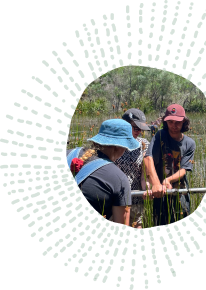Australian Research Council Centre for Excellence
Want to do a PhD or MPhil that really matters?
Work with world-leading researchers and community leaders for better outcomes for Land and Sea Country.
The ARC Centre of Excellence for Indigenous and Environmental Histories and Futures (or CIEHF for short) kicked off on 1 July 2024.
Our vision is to work for Healthy Land and Sea Country, centred in Aboriginal and Torres Strait Islander understandings and approaches and informed by cutting-edge cultural, environmental, and historical research.
Our vision is to work for Healthy Land and Sea Country, centred in Aboriginal and Torres Strait Islander understandings and approaches and informed by cutting-edge cultural, environmental, and historical research.


What sort of research can I do?
Good question! CIEHF’s research is co-designed with Indigenous partners and looks back 1000 years and forward 100 years to develop new approaches to looking after Country.
Our research spans Indigenous knowledges, Indigenous sciences, archaeology, history, ecology, palaeoecology, palaeoclimatology, mathematics, high-performance computing, remote sensing, genomics and much more … the key thing is that your project aligns with the Centre’s research program to support our vision to work for Healthy Land and Sea Country. If you are still not sure if your project aligns, submit an expression of interest and meet with CIEHF staff to talk through your research ideas.
Our research spans Indigenous knowledges, Indigenous sciences, archaeology, history, ecology, palaeoecology, palaeoclimatology, mathematics, high-performance computing, remote sensing, genomics and much more … the key thing is that your project aligns with the Centre’s research program to support our vision to work for Healthy Land and Sea Country. If you are still not sure if your project aligns, submit an expression of interest and meet with CIEHF staff to talk through your research ideas.
Are there any scholarships available?
90 PhD and MPhil stipends are available, including 71 identified for Aboriginal and Torres Strait Islander candidates. In addition, we have an Indigenous Top-Up Scholarship program to further attract and support Indigenous candidates. Scholarships can be undertaken on a full-time or part-time basis. Already got your own scholarship but doing research aligned with the Centre? No problem. You can bring your own scholarship to CIEHF if one of your supervisors is affiliated with CIEHF.
What can we offer?
You will have the opportunity to be supervised and mentored by leading researchers as well as community and industry leaders.
Enrich your experience with a paid industry internship with one of our 20+ Partner Organisations spanning Indigenous organisations, museums, scientific organisations, and industry-leading cultural heritage businesses.
The Centre’s Research Training & Ethics program offers students unique opportunities to grow their skills. Students will be able to complete on Country Masterclasses with Indigenous partners, engage in reflective practice, create mentoring partnerships with experienced researchers and community leaders, connect with peers across disciplines, and develop a broader and deeper understanding of academic and professional life. Costs are funded by CIEHF.
CIEHF also offers a comprehensive Research Support Program, including an Indigenous Project Grants Program and Carer’s Support Grants, along with access to our Indigenous Early Career Researcher Cohort Program and many other opportunities!
Enrich your experience with a paid industry internship with one of our 20+ Partner Organisations spanning Indigenous organisations, museums, scientific organisations, and industry-leading cultural heritage businesses.
The Centre’s Research Training & Ethics program offers students unique opportunities to grow their skills. Students will be able to complete on Country Masterclasses with Indigenous partners, engage in reflective practice, create mentoring partnerships with experienced researchers and community leaders, connect with peers across disciplines, and develop a broader and deeper understanding of academic and professional life. Costs are funded by CIEHF.
CIEHF also offers a comprehensive Research Support Program, including an Indigenous Project Grants Program and Carer’s Support Grants, along with access to our Indigenous Early Career Researcher Cohort Program and many other opportunities!
Where can I study?
You can enrol at any one of CIEHF’s 8 university nodes around the country (James Cook University, Monash University, University of Melbourne, Flinders University, University of Western Australia, University of Tasmania, University of New South Wales, Australian National University).
Submit an Expression of Interest
Email us at ciehf@jcu.edu.au with who you are, what you’re interested in, and we will get in touch.
What is an ARC Centre of Excellence?
ARC Centres of Excellence are the largest and most prestigious research investment made by the Commonwealth Government’s Australian Research Council. They are tasked with maintaining and developing Australia’s international standing in research areas of national priority.
Through ARC Centres of Excellence, significant collaborations occur between universities, industry, organisations and other research bodies in Australia and overseas, to support outstanding research. The objectives of ARC Centres of Excellence are to:
- undertake innovative and potentially transformational research
- link existing Australian research strengths to address the most challenging and significant research problems
- develop relationships and build new networks with major national and international centres and research programs
- build Australia’s human capacity in a range of research areas
- provide high-quality postgraduate and postdoctoral training environments
- offer Australian researchers opportunities to work on large-scale problems
- establish Centres that have an impact on the wider community through interaction with higher education institutions, governments, industry and the private and non-profit sectors.

